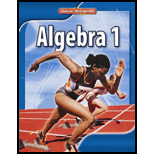
a.
Tabular : Express each statement using an inequality involving absolute value. Do not solve. Copy and complete the table .Substitute the x and f(x) values for each point into each inequality. Mark whether the resulting statement is true or false.
a.
Answer to Problem 42PPS
| Point | f(x)≥x−1 . | True/false | f(x)≤x−1 . | True/false |
| (-4,2) | 2≥−4−1 | true | 2≤−4−1 | false |
| (-2,2) | 2≥−2−1 | true | 2≤−2−1 | false |
| (0.2) | 2≥−0−1 | true | 2≤0−1 | false |
| (2,2) | 2≥2−1 | true | 2≤2−1 | false |
| (4,2) | 2≥4−1 | false | 2≤3−1 | true |
Explanation of Solution
Given: Given table is given below.
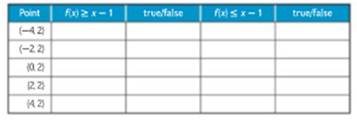
Calculation:
Fill in the table by substituting each point into the given inequalities determining if the inequalities are true or false.
| Point | f(x)≥x−1 . | True/false | f(x)≤x−1 . | True/false |
| (-4,2) | 2≥−4−1 | true | 2≤−4−1 | false |
| (-2,2) | 2≥−2−1 | true | 2≤−2−1 | false |
| (0.2) | 2≥−0−1 | true | 2≤0−1 | false |
| (2,2) | 2≥2−1 | true | 2≤2−1 | false |
| (4,2) | 2≥4−1 | false | 2≤3−1 | true |
b.
You will investigate the graphs of linear inequalities on a coordinate plane.
Graphical : Graph f(x)≥x−1 .
b.
Answer to Problem 42PPS
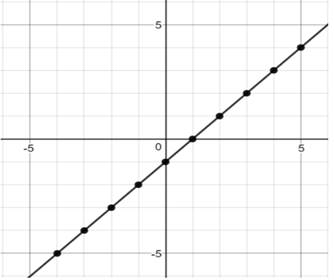
Explanation of Solution
Given: Graph f(x)≥x−1 .
Calculation:
f(x)=x−1 has a slope of 1 and a y -intercept of -1 so plot a point at -1 on the y -axis .Then go up 1 right 1 and plot a second point .Continue going up 1right 1 to plot additional points.
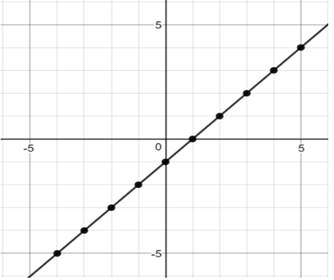
Conclusion:
c.
You will investigate the graphs of linear inequalities on a coordinate plane.
Graphical : Plot each point from the table that made f(x)≥x−1 , a true statement on the graph in red .Plot each point that made f(x)≤x−1 , a true statement in blue.
c.
Answer to Problem 42PPS
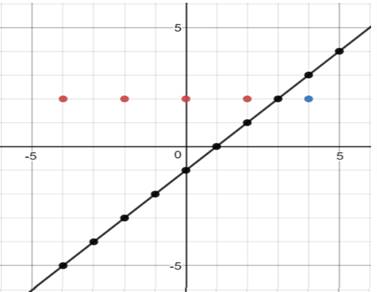
Explanation of Solution
Given: Plot each point from the table that made f(x)≥x−1 , a true statement on the graph in red .Plot each point that made f(x)≤x−1 , a true statement in blue.
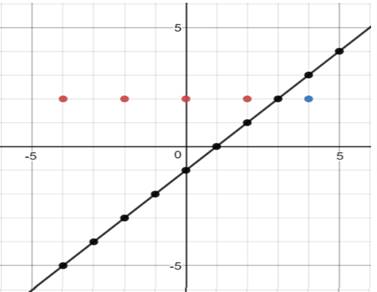
Calculation:
Conclusion:
d.
Logical : Make a conjecture about what the graphs of f(x)≥x−1 , and f(x)≤x−1 , look like. Complete the table with other points to verify your conjecture.
d.
Answer to Problem 42PPS
The graph of f(x)≥x−1 , is the graph of f(x)=x−1 , and then shaded above the line. The graph of f(x)≤x−1 , is the graph of f(x)=x−1 , and then shaded below the line .
Explanation of Solution
Given: Make a conjecture about what the graphs of f(x)≥x−1 , and f(x)≤x−1 , look like. Complete the table with other points to verify your conjecture.
Calculation:
The graph of f(x)≥x−1 , is the graph of f(x)=x−1 , and then shaded above the line. The graph of f(x)≤x−1 , is the graph of f(x)=x−1 , and then shaded below the line .Complete the table with other to verify that this is true:
| Point | f(x)≥x−1 . | True/false | f(x)≤x−1 . | True/false |
| (5,0) | 0≥5−1 | false | 0≤5−1 | true |
| (5,2) | 2≥5−1 | false | 2≤5−1 | true |
| (0.1) | 1≥−0−1 | true | 1≤0−1 | false |
| (-2,-1) | −1≥−2−1 | true | −1≤−2−1 | false |
| (1,-2) | −2≥1−1 | false | −2≤1−1 | true |
e.
Logical : Use what you discovered to describe the graph of a linear inequality.
e.
Answer to Problem 42PPS
If a linear inequality is of the form f(x)≥mx+b, then it will be the graph of f(x)=mx+b, then shaded above the line . If it is in the form f(x)≤mx+b, then it will be the graph of f(x)=mx+b, then shaded below the line.
Explanation of Solution
Given: : Use what you discovered to describe the graph of a linear inequality.
Calculation:
If a linear inequality is of the form f(x)≥mx+b, then it will be the graph of f(x)=mx+b, then shaded above the line . If it is in the form f(x)≤mx+b, then it will be the graph of f(x)=mx+b, then shaded below the line.
Chapter 5 Solutions
Algebra 1
Additional Math Textbook Solutions
Elementary Statistics: Picturing the World (7th Edition)
A Problem Solving Approach To Mathematics For Elementary School Teachers (13th Edition)
College Algebra with Modeling & Visualization (5th Edition)
A First Course in Probability (10th Edition)
Algebra and Trigonometry (6th Edition)
- 8) Solve the given system using the Gaussian Elimination process. 2x8y = 3 (-6x+24y = −6arrow_forward7) Solve the given system using the Gaussian Elimination process. (5x-4y = 34 (2x - 2y = 14arrow_forward33 (a) (b) Let A(t) = = et 0 0 0 cos(t) sin(t) 0-sin(t) cos(t)) For any fixed tЄR, find det(A(t)). Show that the matrix A(t) is invertible for any tЄ R, and find the inverse (A(t))¹.arrow_forward
- Use the infinite geometric sum to convert .258 (the 58 is recurring, so there is a bar over it) to a ratio of two integers. Please go over the full problem, specifying how you found r. Thank you.arrow_forwardH.w: Find the Eigen vectors for the largest Eigen value of the system X1+ +2x3=0 3x1-2x2+x3=0 4x1+ +3x3=0arrow_forwardneed help with 5 and 6 pleasearrow_forward
- 1) Given matrix A below, answer the following questions: a) What is the order of the matrix? b) What is the element a13? c) What is the element a₁₁? 4 -1arrow_forward[25 points] Given the vector let v = ER² and the collection of vectors ε = E-{)·()}-{☹) (9)} = {(A)·(9)}· B: = and C = · {(6)·(})}· answer the following question. (a) (b) (c) (d) (e) verify Verify is a basis for R² and find the coordinate [] of under ε. Verify B is a basis for R2 and find the coordinate []B of ʊ Verify C is a basis for R2 and find the coordinate []c of under ε. under ε. Find the change-of-basis matrix [I]+B from basis B to basis ε, and EE+BUB Find the change-of-basis matrix [I]B+ε from basis Ɛ to basis B, and verify [U]B= [] B+EVEarrow_forwardExplain the following terms | (a) linear span (b) dimension of vector space (c) linearly independent (d) linearly dependent (e) rank of matrix Aarrow_forward
- 3. Let u = 3/5 √ = and = -4/5 -() Define V span{ū, }. (a) (b) (c) Show that {u, } is orthonormal and forms a basis for V. Explicitly compute Projy w. Explicitly give a non-zero vector in V+.arrow_forwardIs 1.1 0.65 -3.4 0.23 0.4 -0.44 a basis for R3? You must explain your answer 0arrow_forwardFind the values of x and y in the following scalar multiplication. 8 2 x 1 3 || y = 9 LY_ Show Calculatorarrow_forward
 Algebra and Trigonometry (6th Edition)AlgebraISBN:9780134463216Author:Robert F. BlitzerPublisher:PEARSON
Algebra and Trigonometry (6th Edition)AlgebraISBN:9780134463216Author:Robert F. BlitzerPublisher:PEARSON Contemporary Abstract AlgebraAlgebraISBN:9781305657960Author:Joseph GallianPublisher:Cengage Learning
Contemporary Abstract AlgebraAlgebraISBN:9781305657960Author:Joseph GallianPublisher:Cengage Learning Linear Algebra: A Modern IntroductionAlgebraISBN:9781285463247Author:David PoolePublisher:Cengage Learning
Linear Algebra: A Modern IntroductionAlgebraISBN:9781285463247Author:David PoolePublisher:Cengage Learning Algebra And Trigonometry (11th Edition)AlgebraISBN:9780135163078Author:Michael SullivanPublisher:PEARSON
Algebra And Trigonometry (11th Edition)AlgebraISBN:9780135163078Author:Michael SullivanPublisher:PEARSON Introduction to Linear Algebra, Fifth EditionAlgebraISBN:9780980232776Author:Gilbert StrangPublisher:Wellesley-Cambridge Press
Introduction to Linear Algebra, Fifth EditionAlgebraISBN:9780980232776Author:Gilbert StrangPublisher:Wellesley-Cambridge Press College Algebra (Collegiate Math)AlgebraISBN:9780077836344Author:Julie Miller, Donna GerkenPublisher:McGraw-Hill Education
College Algebra (Collegiate Math)AlgebraISBN:9780077836344Author:Julie Miller, Donna GerkenPublisher:McGraw-Hill Education





